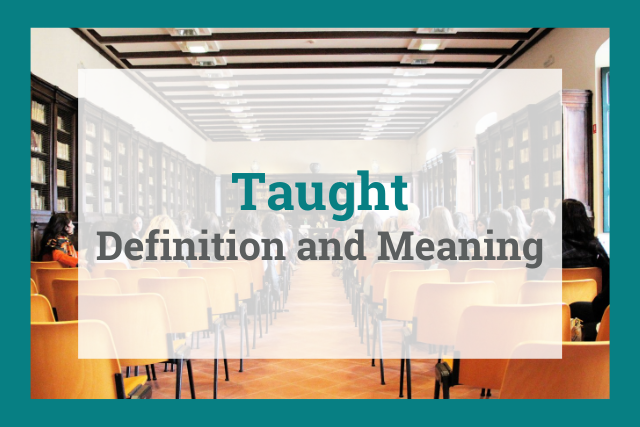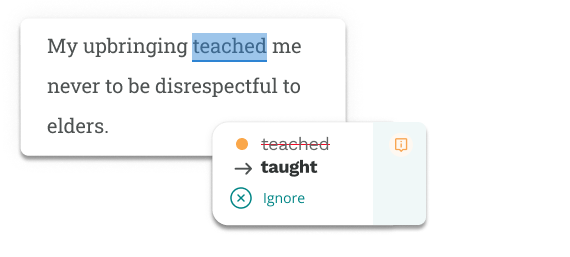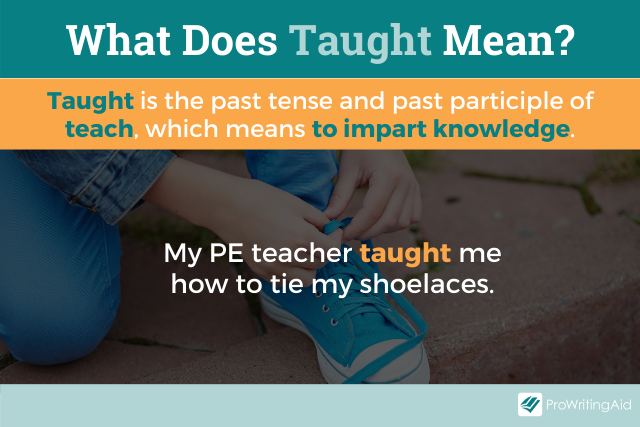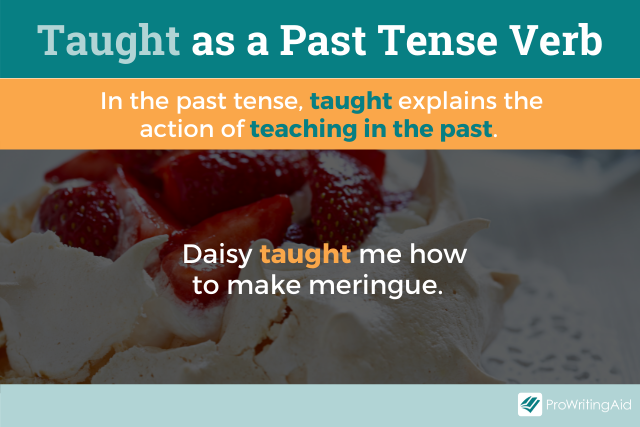
The English language is riddled with specific rules. For example, a common one is this: to transform a regular verb into the simple past-tense form, we can add “-ed” to the end. Examples include “live” (past tense “lived”) and “walk” (past tense “walked”).
Simple enough, right? However, this rule is specific to “regular” verbs. There are plenty of other verbs in English that fall into the “irregular verbs” category that, in turn, have irregular past-tense conjugations, rather than the simple “-ed” ending used for regular verbs.
One example of an irregular verb is “teach.” If “teach” were conjugated as a regular verb, the result would be “teached.” While that seems nice and simple, it’s not the way English works. The correct simple past tense of “teach” is instead “taught.”
The good thing is that grammar checkers like ProWritingAid will highlight incorrect verb conjugations.

See how ProWritingAid corrects incorrect tenses with a free account.
What Is the Meaning of Taught?
Taught is the past tense and past participle of teach, which means “to impart knowledge,” as a teacher would do in a classroom.

Subjects are taught in school. Other things that are often taught are languages, skills, sports, and morals. For example:
- I taught my son how to play football.
- I was taught Spanish until I left school.
It follows an irregular past-tense formation as opposed to words like cooked, loved, and baked.
It’s important to remember that “teached” is not a word.
Taught in a Sentence
Since taught functions as both the past tense and past participle of teach, let’s look at some examples of taught being used in a sentence for both.
Taught in the Past Tense
- Computer Applications is now taught as part of the school curriculum.
- John taught at the local high school.
- He came once a week and taught her how to play the violin.
- My father taught me not to talk to strangers.

Taught as a Past Participle
- His sister had taught him how to whistle.
- Mary has taught her little brother his ABCs.
- He had taught me how to be a good person.
- We have taught our child the best we know how.

Is It “Has Taught” or “Had Taught”?
Taught acts as both the past tense and the past participle, so it’s appropriate to use “has taught” and “had taught,” where applicable. “Has taught” functions as the present-perfect tense, while “had taught” is the past-perfect tense.
Is It “Taut” or “Taught”?
“Taut” and “taught” are homophones—words that sound similar but have different meanings and/or spellings. The only word that sounds similar to taught is “taut.” Be careful to pick the right word, as “taut” and “taught” are different types of words with different definitions and do not share a common origin.

Taut is an adjective that means to be pulled tight. Synonyms include rigid, tight, and tense. Things that are often described as being taut are skin, ropes, strings, lines, muscles, the voice, bodies, bowstrings, wires, nerves, necks, and drums. For example:
- The skin was pulled taut across his face.
Taut can also be used to describe a tense situation. For example:
- He walked in the room and sensed how taut the conversation had been.
Recap: Taught vs. Taut
What does “taught” mean? “Taught” is the past tense and past participle of the verb “teach.”
It is not to be confused with “taut,” which sounds similar. “Taut” means something that is rigid and tense.


